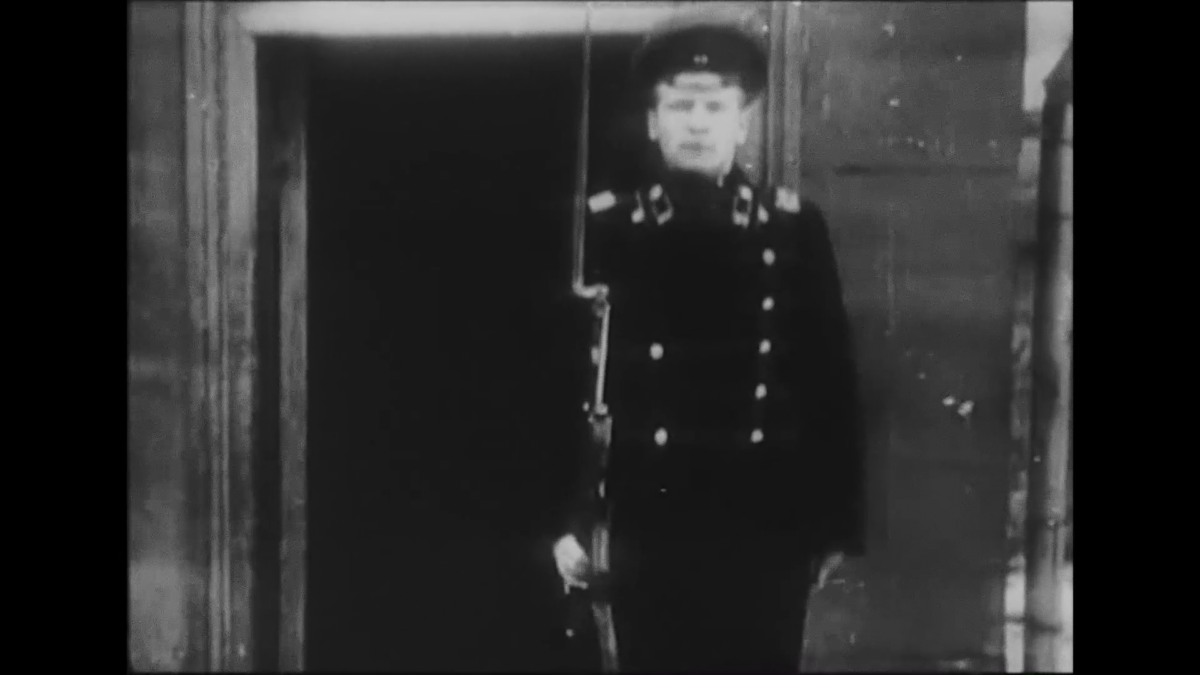Disposable love
- Technical Info / Información Técnica:
(2024) / 01:20:00 / Buenos Aires, Argentina / First Documentary Feature: Found Footage, Video Archive, Cinema, Essay, Autobiography, Politics, Home-Movies, Portrait, Middle-Class, 1990s, Television / HD – Found Footage / 25 fps / color-B&W / 5.1 / 16:9
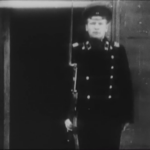
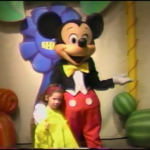
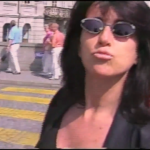
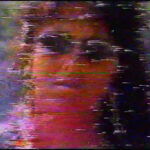
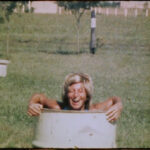
- Short Synopsis / Sinopsis Corta:
In home-movies shot in the ‘90s by her father, the filmmaker discovers in these inherited images powerful fictions of the Argentinian middle class and the country’s recent history.
A partir de vídeos domésticos filmados en los años noventa por su padre, la realizadora descubre en las imágenes heredadas poderosas ficciones de la clase media argentina y la historia reciente.
- Synopsis / Sinopsis:
On her 10th birthday, Azul receives from her father a DVD compilation with videos of her childhood. Twenty years later, she discovers in these images a fresco of the Argentinian middle class. In dialogue with her hard-of-hearing mother, she wonders if it might be possible to create other futures by twisting what is inherited.
Al cumplir diez años Azul recibe de su padre un DVD compilatorio con videos de su infancia. Veinte años después, descubre en estas imágenes un fresco de la clase media argentina. En diálogo con su madre hipoacúsica se pregunta si es posible torcer lo heredado en pos de otros futuros.
- Long Synopsis / Sinopsis Larga:
In the first found-footage film in the history of cinema, we may find the filmmaker’s great-grandfather, a deserter from the Russian Revolution. A century later, while rewatching her own home movies, shot in the ‘90s by her father and compiled on DVD, Azul discovers powerful fiction of a social class. Tracing the film scraps in dialogue with her hard-of-hearing mother, Azul wonders if it might be possible to twist that inherited in pursuit of an emancipatory destiny.
En la primera película de found-footage de la historia del cine, podría encontrarse el bisabuelo de la realizadora, desertor de la Revolución rusa. Un siglo después, Azul descubre en sus propios videos domésticos, grabados durante los años 90 por su padre y compilados en un DVD, poderosas ficciones de una clase social. Remontando los descartes en diálogo con su madre hipoacúsica, Azul se pregunta si es posible torcer lo heredado en pos de un futuro emancipado.
- Director´s Biography / Biografía del Director:
AZUL AIZENBERG
Azul Aizenberg is a filmmaker and teacher. She studied at the University of Cinema. Since 2018 she has taught amateur cinema from the platform Ver y Poder. She wrote, directed, and edited The Stonebreakers (2021) screened at Jihlava IFF, Berlin Critic’s Week, and Hamburg IFF, among others. «Disposable Love» is her first feature film. She is currently developing his next film, The Great Absentees.
Azul Aizenberg es cineasta y docente. Realizó sus estudios en la Universidad del Cine. Desde 2018 imparte cine amateur desde la plataforma Ver y Poder. Escribió, dirigió y editó Las Picapedreras (2021) seleccionado en Jihlava Documentary Festival, Berlin critic ‘s week, Hamburg ISFF, entre otros. Amor descartable es su opera prima. Actualmente desarrolla su siguiente film, Los grandes ausentes.
Filmography / Filmografía:
– Las Picapedreras/The Stonebreakers (2021) 16 min, documentary short film: Jihlava IDFF (Int. Premiere)
- Director’s Statement / Declaraciones del Director:
“Amor descartable” (“Disposable Love”) is a song that my father taught my mother long before they separated. You are my obsession / I want to catch you / You are my destruction / I can’t stop thinking. My mother, who is hard of hearing, sings these words off-key. Her singing is a way of reinterpreting that which is passed down to us or inherited, especially when it hurts. Disposable Love is a film made with inherited material that tells many stories and none at the same time: the story of the first female film director who reused images shot by others to put at the disposal of the Revolution, the story of a rising middle-class family during the 1990s and the legacy of an aspiring filmmaker father, the story of another family who built their own house in the utopian 1970s, and the story of a young director who rescues these images through the last glimpses of archive, comprised of ripped video, VHS and Super 8 tapes, and cell phone photographs. And, like the characters in the Disney films that shaped her childhood, she seeks to break the spell that destines her to reproduce the family fiction of her social class.
“Amor descartable” es una canción que mi padre le enseñó a mi madre mucho antes de que se separaran. Vos sos mi obsesión / Quisiera atraparte / Vos sos mi destrucción / No puedo dejar de pensar. Mi madre, hipoacúsica, canta estas palabras con un timbre desafinado. Su canto es una forma de reinterpretar aquello que nos es transmitido o heredado, especialmente cuando ello duele. Amor descartable es una película hecha con materiales heredados que narra muchas historias y ninguna a la vez: la historia de la primera directora de cine que reutilizó imágenes filmadas por otros para ofrecerlas a la Revolución, la historia de una familia de clase media ascendente durante los años noventa y el legado de un padre aspirante a cineasta, la historia de otra familia que construyó su propia casa en los utópicos años setenta, y la historia de una joven directora que las rescata a través de los últimos destellos de archivos: video ripeados, cassettes VHS, cintas super8, fotografías de celular. Y, como en las películas de Disney que forjaron su infancia, busca romper el hechizo que la destina a reproducir las ficciones familiares de su clase social.
“Amor descartable” (“Disposable Love”) is a song my father taught my mother long before they separated. My mother, who is hard of hearing, sings it out of tune. Her singing is a way of reinterpreting that which is passed down to us or inherited, especially when it hurts. I was given these home videotapes that hide, under their apparent lightness, the projections of a family, a social class, and a country. Digging into the ruins of the past, I search for the germs of a future that will make us freer.
“Amor descartable” es una canción que mi padre le enseñó a mi madre mucho antes de que se separaran. Mi madre, hipoacúsica, la canta desafinada. Su canto es una forma de reinterpretar aquello que nos es transmitido o heredado, especialmente cuando ello duele. A mi me fueron legadas estas cintas de video domésticas que esconden, bajo su aparente levedad, las proyecciones de una familia, una clase y un país. Excavando en las ruinas del pasado, busco los gérmenes de un futuro que nos haga más libres.
- Overview / Ficha técnica:
Script / Guión: Azul Aizenberg
Producer / Producción: Azul Aizenberg, Florencia Azorín
Executive Producer / Prodccióon Ejecutiva: Florencia Azorín
Director / Director: Azul Aizenberg
Director Assistant / Asistente de Dirección: Enrique Biondini
Camera / Cámara: Azul Aizenberg, Andrés Aizenberg, Sergio Aizenberg, Fernando Segal
Sound design / Diseño de sonido: Esteban Bellotto Kuzminsky
Sound Mix / Mezcla de Sonido: Mercedes Gaviria Jaramillo
Film Editor / Montaje: Mario Bocchicchio, Azul Aizenberg
Original Music / Música original: Agostina Yacosa
Color: Daniela Medina Silva
Graphic Design / Diseño Gráfico: Tatiana Mazú González
- Festivals & Awards / Festivales y Premios:
- Links:
Social Networks
https://www.instagram.com/laespigadoracine
http://instagram.com/films.to.festivals
https://www.facebook.com/films2festivals
- Contact / Contacto:
GISELA CHICOLINO
FilmsToFestivals
